alert!In addition to thermal radiation, there are these invisible hazards at high temperatures. Many people don’t know ...
Author:Guizhou disease control Time:2022.08.14
This summer, 40 degrees of high temperatures are common, and vocabulary such as "heat stroke" and "heat ejaculation" once again entered the public's vision. Severe thermal radiation disease can lead to multiple organ failure. Once, the mortality rate is extremely high, which has attracted widespread attention.
But do you know that in addition to physical damage, another harm caused by high temperature is quietly affecting people's health, that is, "psychological heat stroke."
PART.1
What is psychological heat stroke?
Psychological heat stroke refers to the abnormalities of emotions, cognition and behavior in hot summer. Medically, it is called "summer emotional disorders". It is mainly manifested as emotional irritability, disturbance of thinking, and easy to irritate and feels out of control.
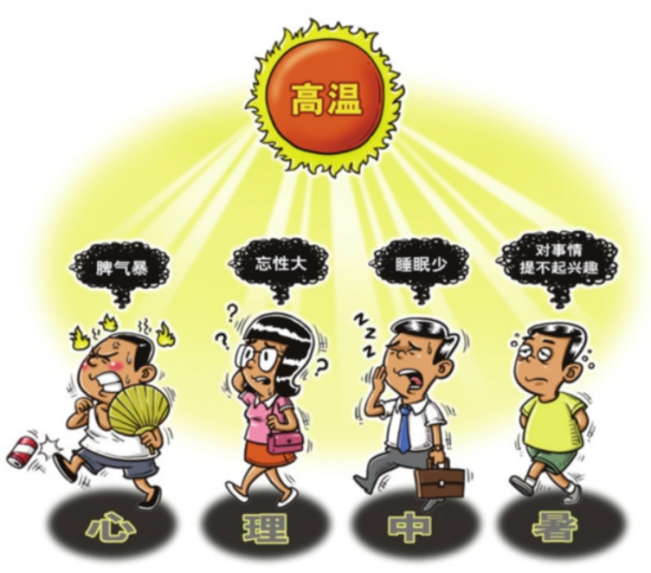
Psychological heat stroke symptoms
(Picture source: Jining News Network)
Psychological heat stroke often occurs in summer and hot weather, especially the heat wave day, that is, the days when the temperature exceeds 35 degrees Celsius for three consecutive days.
If psychological heat stroke does not intervene, it will have an impact on individual mental health and physiological health.
The "psychological heat stroke" brought by high temperature has been confirmed by many researchers. Many experiments show that on high temperature days, the rate of visits of psychological emergency department will generally increase (including material use disorders, anxiety, stress -related and physical disorders, emotional disorders, etc. Wait, see Figure 2).
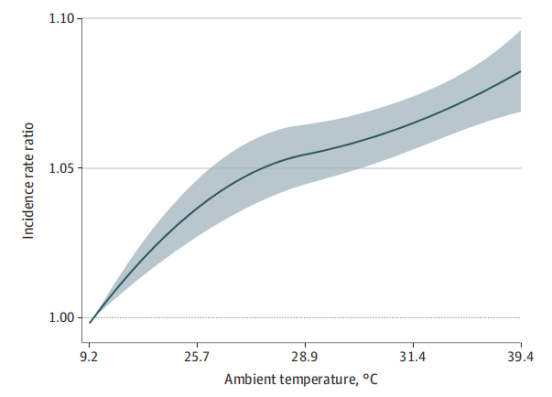
The relationship between temperature and psychological emergency departmental department
(Picture source: nori-sarma, a.et al., 2021)
High temperatures are related to attacks between interpersonal and groups, violent suicide behaviors, and emotional problems such as depression, anxiety and anger.
Researchers have found that seasonal fluctuations will occur in attack and suicide behavior. Attack incidents that occur in summer, such as domestic violence, social riots, and interpersonal conflicts are more than other seasons of the year. Within a certain range, there is a positive correlation between the increase in temperature and the risk of suicide (see Figure 3). When the temperature exceeds 18 ° C by 1 ° C, the relative risk of suicide behavior will increase by about 3.8%.
In addition, the study also found that the number of admission of dual -phase emotional disorders, depression and anxiety was positively related to the temperature on the day. In high temperature weather, compared to low temperature, people generally report more serious depression and anxiety.
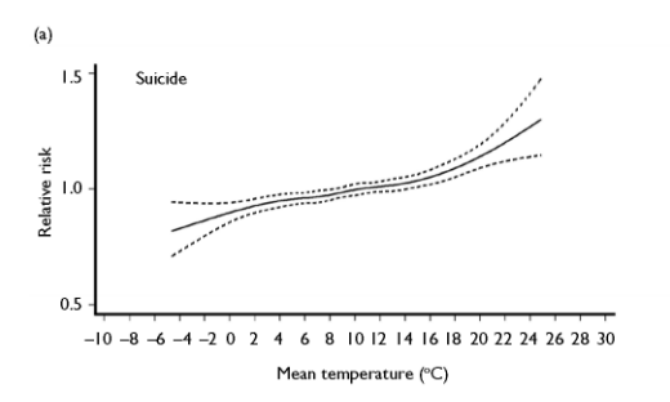
The relationship between the average temperature and suicide risk
(Picture source: Page, L. A., Hajat, S., Kovats, R. S., 2007)
So, what causes "psychological heat stroke"?
PART.2
What are the factors of "psychological heat stroke"?
Scientists have tried to explain the "violence tendency" from different angles.
First of all, from the perspective of biological mechanisms, neurotransmitters, such as serotonin and dopamine, will change with seasonal changes and are negatively related to impulse and aggressiveness (Gao et al., 2019).
Hot weather can lead to decrease in serotonin and dopamine, not only increase people's aggressiveness and implicitability, but also reduce human inhibitory functions, which leads to out of control (see Figure 4).
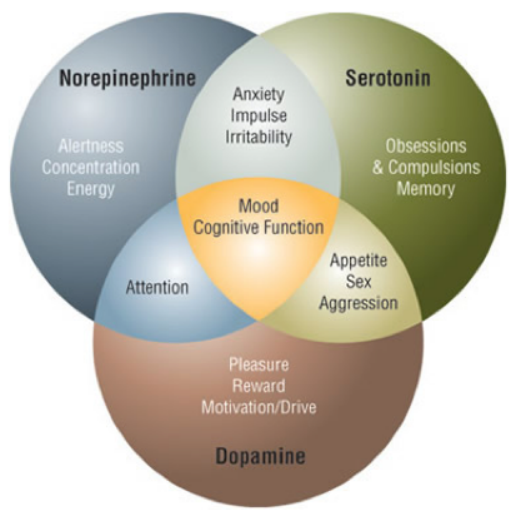
The role of dopamine, serotonin, and norepinephrine
(Image source: TheSpinalcentre.com.au)
In addition to neurotransmitters, neuritis brought by high temperature may also play a role. Some studies have proven to have significant neuritis reactions and neuron cell deaths exposed in high -temperature environments. This may pay attention to attention. , Memory or personality has a long -term impact.
These inherent changes in the brain may reduce people's cognition of the environment and their adaptability, which may cause them to be more likely to be exposed to high temperature environments and affected by high temperature.
This can also explain why those patients with mental illness or nervous system, such as Alzheimer's disease, will be more vulnerable to high temperature.
In addition, some researchers proposed the theory of brown adipose tissue (He Bin, Wang Bingwei, Zheng Ruimao, 2016). Brown adipose tissue is one of the main sources of heat production in mammals, which has an important role in maintaining the internal stability of animals (see Figure 5), and high temperature will excessively activate such tissues to damage the heat resistance of the human body. This damage will be damaged. This damage will be damaged. It will change the neural activity of the brain area projected by the brown fat tissue, cause people to produce abnormal emotions or behaviors, and affect individual mental health.
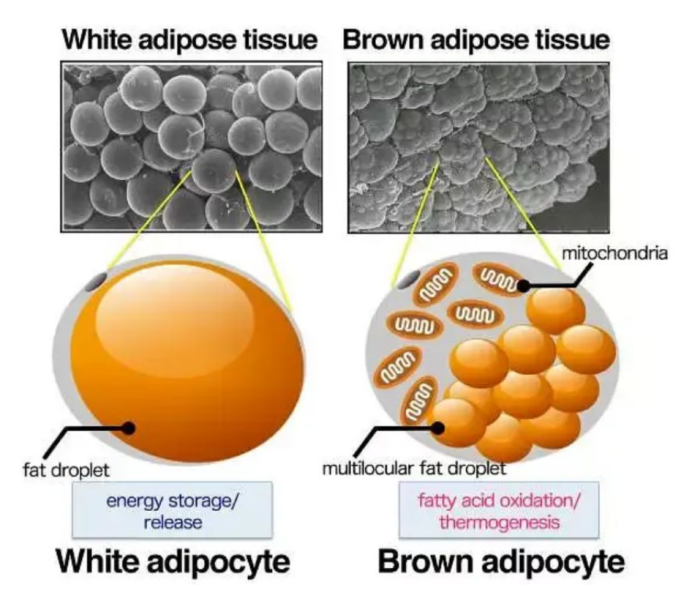
White fat and brown fat
(Picture source: DESHMUKH, A. S.et al., 2019)
Secondly, from the perspective of sociological mechanisms, people are more likely to use excessive alcohol (Thompson, R.et Al., 2018) in hot days, such as drinking ice beer to relieve heat.
Individuals are also prone to anxiety and stress in high temperature environments, and individuals consciously cannot alleviate this high temperature situation and further exacerbate negative emotions. Therefore, they tend to use alcohol and other substances to relieve stress emotions. It makes it easier for individuals to show impulsive attacks.
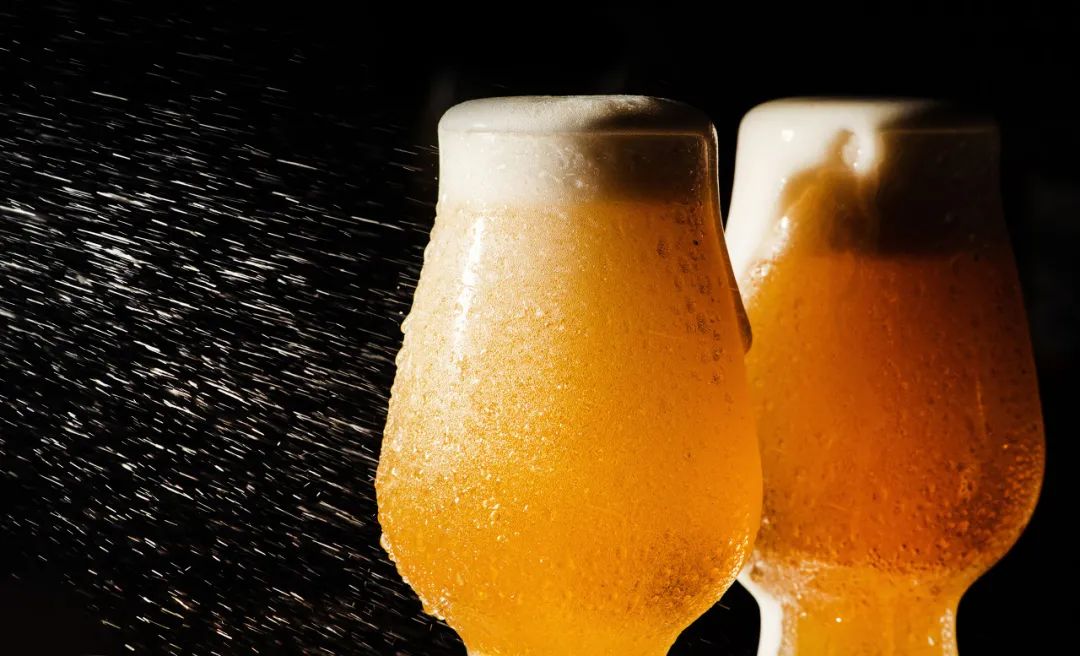
Drink ice beer in summer
Finally, from the perspective of cognitive psychology, the emergence of this kind of violence is not related to anger, and according to the emotional theory of Shaht -Singh, our emotions are related to the perception of cognitive response to physiological reactions. (See Figure 7).
This theory can explain our well -known "suspension bridge effect". When we go to the suspension bridge with another friend, a heartbeat will be accelerated. This is due to nervousness and fear. "Like friends", then we will really have the emotions we like, and we will have a "suspension bridge effect". Shaht-Singh Emotional theory
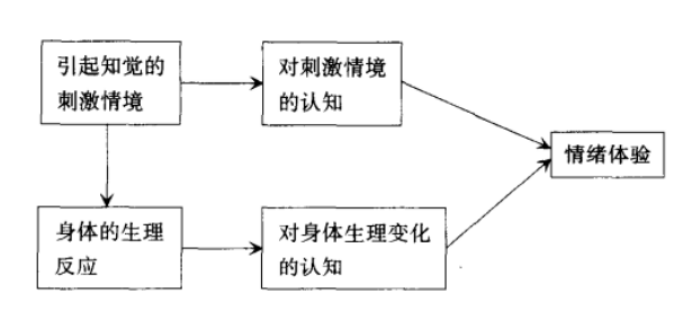
(Picture source: Introduction to Psychology, Liang Ningjian)
So how does this theory use the relationship between high temperature and anger?
In a high -temperature environment, individuals are prone to sweating, thirst, and fever, and other physiological reactions. This kind of physiological reaction is similar to the physiological reactions when we are angry. At this time We are likely to explain the current physiological reactions as "angry" and have anger, and even "violent tendencies", which is why we feel that it is easier to be stimulated in a hot environment and more vulnerable to anger. Essence
Of course, in addition to anger, depression, anxiety, and other emotional problems are all rising factor of violence. In fact, high temperatures really aggravate negative emotions such as depression and anxiety, and what are the specific reasons?
In fact, there is a U -shaped relationship between the temperature and the mental health (Mullins, J. T., White, C., 2019). When the temperature is very high, the frequency of people's outs is greatly reduced to reduce the opportunity to contact high temperature. The level of mental health will improve.
The impact of this temperature on psychological health and emotional problems often take cognitive factors as the intermediary.
The temperature will cause the body and brain temperature to rise, and the impact of neurotranslation can directly lead to a reduction in cognitive function, response ability or pressure threshold. Therefore, people's emotional regulation capacity will decrease, which will lead to a series of negative emotions and emotional disorders. produce.
For the elderly or dementia, this destructive power may be greater.
Psychologists who hold health and maintain the theory of behavior proposes that when the high temperature lasts for several days or weeks, the adaptive strategy of personal physiology and behavior will be challenged. Outdoor Games with physiological and mental health have decreased significantly.
Existing evidence shows that temperature will affect the time of outdoor activities (Brown, BARTON, GLADWELL, 2013), which will cause individual adaptation and normal pressure to alleviate problems, so it is easier to lead to emotional problems.
Outdoor sports

From the perspective of sleep interruption caused by high temperature, there is evidence that sleep problems are related to almost all mental illness or mental disorders (that is, dementia, emotional disorders, addiction, schizophrenia, etc.) C., 2019).
High temperature at night will significantly lead to decreased sleep quality and decrease in sleep duration (see Figure 3). This sleep problem is directly related to the increase of irritability, frustration and negative emotions. This can explain that during the heat wave, the high temperature of continuous day and night temperature can cause deterioration of psychological health.
The relationship between temperature and sleep quality and sleep duration
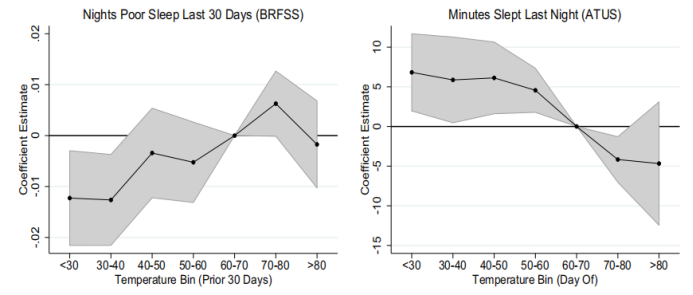
(Picture source: Mullins, J. T., White, C., 2019)
PART.3
How to prevent psychological heat stroke?
Based on the discussion of psychological heat stroke mechanisms and sensible people, we must put forward some useful prevention suggestions. Because high temperature will have many adverse effects on physical, psychological and behaviors, and with the continuation of global warming, this impact may become more important than other factors.
So how should we reduce the psychological impact of high temperature on us?
1. Appropriate cause. Remember the discussion of emotional attribution before? Once we attribute the physiological reactions because of the offending behavior of others instead of high temperature, individuals will be more likely to have anger.
Therefore, if individuals can clearly know that temperature will affect their emotions, it is more likely to attribute their response to high temperature weather, not external events, and then correct their emotions and behaviors.
2. Sleep well. A study in Germany showed that the increase in sleep brought by summer time caused suicide attempts to reduce suicide by nearly one -third. It can be seen how important good sleep is for our emotional state. Maintaining normal schedules and sufficient sleep time is not only conducive to physiological health, but also strengthening our mental health.
Maintain a good sleep quality

3. Drink less. In the summer, the conflict caused by drinking is not uncommon. For reducing such violence, not only the participation of public security management, but also people need to improve their awareness of drinking harm, reduce drinking as much as possible, keep themselves sober and restraint, and reduce the occurrence of violence.
4. Home and office. In unusually high temperature weather, such as the heat waves above 40 degrees, you need to arrange the office office appropriately to arrange holidays for workers who work outdoors to reduce the commute time.
Source: Science Popularization China
- END -
The seventh batch of national drug collection is planned to be selected 327, with an average price reduction of 48%
In order to implement the decision -making and deployment of the Party Central Committee and the State Council on promoting the procurement of centralized drugs, under the guidance and guidance of rel
Want to get pregnant after uterine cavity adhesion?Missing this time, the operation may be done in vain

If you ask what young people are most afraid of now, having children must be on th...